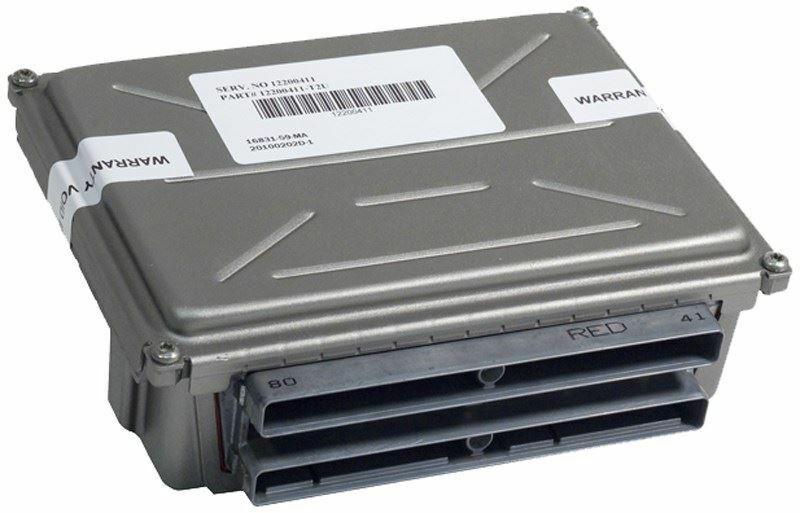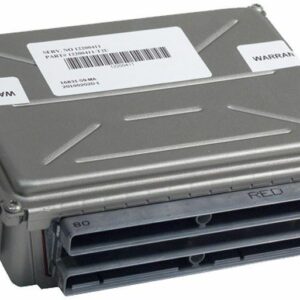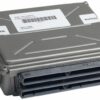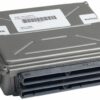If you’re dealing with a frustrating Check Engine Light, poor fuel economy, or erratic engine behavior in your 2001-2003 Chevrolet Malibu, the Powertrain Control Module (PCM) is often the root cause. As a technician with over two decades of experience, I’ve seen firsthand how a failing PCM can create a cascade of hard-to-diagnose issues. This isn’t just a component; it’s the central computer for your engine and transmission, and when it falters, your vehicle’s reliability and performance suffer dramatically.
We’re offering a dependable and straightforward solution. This Powertrain Control Module, part number 12202600, is the correct component to restore your vehicle’s factory performance. The biggest advantage we offer is our pre-programming service. Before we ship the module, we flash it with the latest official GM software updates, specifically matched to your vehicle using the VIN you provide. This critical step means you can avoid a costly and time-consuming trip to the dealership. For a DIY mechanic or a professional shop, this means a faster, more efficient repair, getting you or your customer back on the road with confidence. A properly functioning 2001-2003 Malibu PCM is essential for managing everything from fuel injection to transmission shift points, ensuring your car runs as it should.
Case Study: The Malibu That Wouldn’t Cooperate
A customer brought in a 2002 Malibu with a complaint that stumped two other shops: intermittent stalling at stoplights and a persistent P0606 (PCM Processor Fault) code that would return days after being cleared. They had already replaced the spark plugs and an O2 sensor with no luck. After connecting my scan tool, I noticed the live data for the fuel trims was jumping all over the place, indicating the computer was struggling to maintain a stable air/fuel ratio. This erratic data, combined with the P0606 code, pointed directly to an internal PCM failure. We installed one of our VIN-programmed modules, and the problem was solved instantly. The fuel trims stabilized, the car idled smoothly, and the code never returned. It’s a classic example of how chasing symptoms can be a waste of time and money when the vehicle’s brain is the real issue.
Is Your Vehicle Showing These Symptoms?
A failing PCM can manifest in numerous ways. If you’re experiencing any of the following, this module is the likely solution.
- ✔ Check Engine Light is illuminated with codes like P0601, P0606, or other communication (U-prefix) codes.
- ✔ Your vehicle fails to start or has a hard starting condition.
- ✔ Noticeable decrease in fuel economy.
- ✔ The engine runs rough, misfires, or stalls unexpectedly.
- ✔ Harsh or erratic automatic transmission shifting.
- ✔ Failure to pass an emissions test.
A Straightforward Guide to Your PCM Installation
Installing your new 2001-2003 Malibu PCM is a manageable job for a confident DIYer. For the Malibu, the module is typically located in the left-hand (driver’s side) of the dash. Always consult a repair manual for your specific vehicle’s location if you are unsure.
- Safety First: Always disconnect the negative terminal from your vehicle’s battery before starting any electrical work.
- Locate the Module: Find the existing PCM inside the vehicle, on the driver’s side of the dashboard. You may need to remove a lower dash panel for access.
- Disconnect Connectors: Carefully unclip the wiring harness connectors from the old module. These connectors have locking tabs that need to be released before pulling. Do not force them.
- Remove the Old PCM: Unbolt the old module from its mounting bracket and remove it from the vehicle.
- Install the New PCM: Mount your new, pre-programmed module in the same location and secure it with the original bolts.
- Reconnect Everything: Firmly plug the wiring harnesses into the new module until they click into place. Reconnect the negative battery terminal.
- Final Step: In some GM vehicles of this era, a security relearn procedure may be necessary for the vehicle to start. This typically involves turning the key to the ‘ON’ position for 10-15 minutes, then off, and repeating two more times. This allows the new PCM to synchronize with your vehicle’s anti-theft system.
Verified Vehicle Compatibility List
This module is a direct replacement for part numbers 12202600, 12209614, and 09360210. It is guaranteed to fit the following GM vehicles. Please verify your specific model and options.
- Alero: 2001-2003 (3.4L)
- Aurora: 2001-2002 (3.5L)
- Aztek: 2001-2003
- Century: 2001-2002
- Grand Am: 2001-2003 (3.4L)
- Grand Prix: 2001-2003 (3.1L)
- Impala: 2001-2003 (3.4L)
- Intrigue: 2001-2002
- Lumina Car: 2001
- Malibu: 2001-2003
- Montana: 2001-2002
- Monte Carlo: 2001-2003 (3.4L)
- Regal: 2000-2002
- Rendezvous: 2002-2003
- Silhouette: 2001-2002
- Venture: 2001-2003
Your Questions Answered
Frequently Asked Questions
Do I need to do any programming myself?
No. We handle all the programming before shipping. We use your VIN to flash the module with the correct, updated GM software for your specific vehicle, making it ready for installation right out of the box.
Why do you need my VIN?
The Vehicle Identification Number (VIN) is crucial. It allows us to access the exact software calibration file for your car’s engine, transmission, and options. This ensures perfect compatibility and optimal performance, just like a new module from the factory.
Will this fix my check engine light?
If the check engine light is caused by a faulty PCM (with codes like P0601, P0606, etc.), then yes, this part will resolve the issue. However, you should always ensure other potential causes (like faulty sensors) have been ruled out for a complete diagnosis.
Where is this module located on my 2001-2003 Malibu?
For the 2001-2003 Chevrolet Malibu, the PCM is located inside the car, on the left-hand (driver’s side) of the dashboard. For other models listed, it may be in the dash or in the engine compartment. Always verify the location for your specific vehicle.
Is this a simple plug-and-play installation?
Yes, for the most part. Once you swap the hardware, you may need to perform a simple security relearn procedure, which involves cycling the ignition key. This common procedure takes about 30 minutes and requires no special tools.



